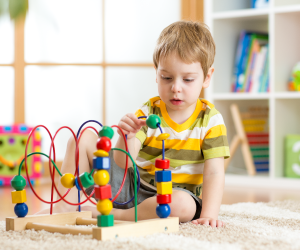 I think every parent at some point in time has told or would tell their child this!
I think every parent at some point in time has told or would tell their child this!
“You have to be confident!”
Well, how often had you been told this as a child?
But before that, what is this confidence? Where does it stem from? How can we shape it?
Let’s take a closer look…
Self-confidence stems from childhood. And it’s much more crucial that confidence is built at a young age than at a later stage because it sets the foundation for how a person grows and what they grow to be.
Vidya Ragu — a psychologist, learning, and development specialist — and Dr Pallavi Rao Chaturvedi — Founder of Get Set Parent — speak about confidence and share some cool pointers on the A-Z of building self-confidence in children!
Before we delve into the crux of confidence, let’s debunk a myth!
Debunking the confidence myth
Does your child not interact with guests or shies away from a stage performance?
“That’s got nothing to do with confidence alone. It could be the child’s personality. There are different kinds of personalities and their different inclinations that children have, ” explains Vidya.
Therefore, these choices and behaviours come and go as phases in your child’s life.
Perhaps, one day your child will walk onto the stage and deliver a speech that would leave you joyfully speechless!
So, how can we understand self-confidence then?
What is confidence?
“Confidence is directly built to the self-esteem of a child or the self-image of a child,” says Vidya.
 When your child looks into the mirror, do they love and accept themselves?
When your child looks into the mirror, do they love and accept themselves?
It’s as simple as that!
“Whenever a child is dealing with some situations you know as growing up and going into real life and dealing with his environment, situations, if he is able to hear himself, say to himself “I can” versus “I can’t”, that is confidence!” elaborates Vidya.
Where does self-confidence come from?
“As parents, our ultimate aim is to raise children who are confident, who are able to solve problems, who are independent, isn’t it?” wonders Dr Pallavi.
Skills
Every time your child improves their skills and they know (through feedback) that they’ve improved their skills, they become more confident.
Self-inquiry
When your child does a job well, we appreciate them, but leave it at that.
Next time, try this – go one step further and ask them questions about how they did the job.
Eg: If your child coloured a mango, ask them about how they chose the colours or how they coloured within the border. This will make them self-reflect and gain a better understanding.
Make it challenging
If your child is used to a particular pattern of completing tasks, UP the game a bit by adding a closer deadline or make the rules more challenging for them. (And you can use that extra time to spend time together!)
You can add incentives or change the approach altogether to make tasks more exciting for your child.
And don’t forget the most important part – give genuine feedback!
If your child has done a good job, appreciate it. But if they haven’t, then push them to make them reach their potential.
How to shape your child’s confidence?
Confidence comes from what’s happening in and around a child.
“So research proves one of the most fundamental foundations of a child’s confidence is the parents,” says Vidya.
Set the right environment
“I think learning starts at home! Our children don’t know a lot of things and if we keep putting them down, all of this is going to break your child’s confidence,” says Dr Pallavi.
Children are constantly observing. What you speak to them and how you speak to them becomes their driving force as they grow up.
So if you shout, scold, say more NO’s, or reprimand them or even if you as a parent are constantly saying ‘I CAN’T’ to yourself and your child hears you, it impacts and influences their thinking.
So it’s important to analyse what kind of environment you are setting.
Empower your child
When your child is unable to do something, it’s important that you not just address the fact that they can’t do it, but also guide them on how they can do it. Empower your child by teaching them!
“You are the child’s teacher. You need to work on how to make your child feel good. If your child feels good at home, your child will go out and radiate that confidence that he or she gets from home,” says Dr Pallavi.
Move your child from the CAN’T Zone:
 The good news is, you can reduce the can’ts while you interact with your child.
The good news is, you can reduce the can’ts while you interact with your child.
The bad news is, there are many others in the environment who are throwing Can’ts and ‘NOs’ at your child.
Research shows that by the time a child turns 5, they hear much more NOs and CAN’Ts than any other word!
So how do you make them move from this negative zone?
Let’s call an UBER! 🙂
The Secret Formula That Will Build Your Child’s Self-Confidence
U – US
Be conscious as a family of the environment you are setting for your child. What you say to your child, what you speak in front of them, the tone in which you speak, every little thing matters. You may notice a pattern that you are setting that is actually pulling down their confidence.
Discuss and write down these points as a family, so each of you knows where you’re stepping out of line.
Instigate the desire to learn more.
B – Build the desire in your child to know more, do more and learn more
Learning is very important to sustain your child’s confidence in the long run.
To build this desire, use conversations and confidence-building activities!
And instead of pushing it to your child directly, you can instigate the fire in them.
Eg: When you’re driving, you can tell your child, “Oh, I wish I could drive that truck”, or “Oh, I wish I could cycle as powerfully as that girl there”. By doing this yourself, you are inspiring your child to also learn and know more.
And hey, you can also make dinner table conversations exciting…
When you sit down to eat together, you can ask each other as a family, “So what did you learn today?” or “I learnt how to write my name backwards. What about you?” or you can share something that you learned from the house help!
These productive discussions build a desire for children to do more.
E – Engage
 Instead of just putting your child in a class, engage with them – talk to them, ask them about their skills, encourage them and appreciate them by giving your feedback.
Instead of just putting your child in a class, engage with them – talk to them, ask them about their skills, encourage them and appreciate them by giving your feedback.
“Do a variety of things with them, which will give them good confidence in terms of language, thinking skills, problem-solving skills, etc.,” says Dr Pallavi.
Engaging your child will also help remove their fears and increase their confidence.
“Give your child many opportunities,” adds Dr Pallavi.
R – Rituals
Rituals can help build healthy habits. And confidence-building becomes much easier when there are rituals.
Eg: Since physiology plays a huge factor in a person’s confidence, in the mornings, you can encourage your child with a healthy ritual such as – to go running or walking.
And as the name suggests, these are rituals and not a one-time thing. You need to actively and consistently plan these into their timetables every day.
“Give your child more opportunities! How did we build our confidence? We practised. Whatever we were not good at, we practised,” explains Dr Pallavi.
Mind-maps
You can also make use of mind-maps to understand how you as a family are growing or where you are going.
Mind-maps are, more or less, representations of what we see.
Some children may not enjoy talking or expressing as much as we do, and since mind-maps is all about drawing, you’ll be able to see their raw feedback on the canvas.
Play as a family
Playing games together as a family will build your child’s skills.
Eg: You can build your child’s communication or expression by asking them to talk for 3-mins straight… Or you can improve their creativity by playing a story-building game.
And since it’s all a game, children don’t feel the fear of being judged or tested for something.
RELATED: Parents, Here Are Some Genius Things To Do When Your Child Is Bored
Conclusion
The only antidote to build confidence is ‘action’…
This means, every time your child acts on something, they are becoming confident.
So give your child more opportunities, challenges and support to build their skills, attitude, and knowledge.
We’re sure this will help raise your child’s confidence level and take life head-on in a fun way!
You May Also Like
18 Essential Life Skills To Equip Your Child For The Real World
13 Mind-Blowing Tips To Increase Concentration Power In Kids







10 Must-Try Exercises and why you need it - olivebabyshop.com
[…] Imagine how confident your child becomes! […]
9 simple ways to prepare your preschoolers - olivebabyshop.com
[…] even the tiniest of worries addressed can help build confidence to enter a space of learning and […]